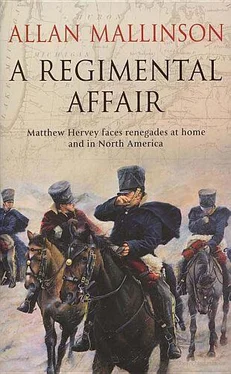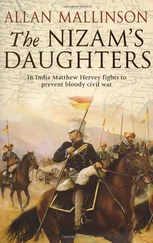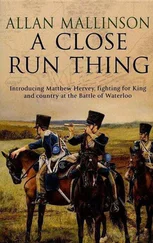‘And may I respectfully remind you, gentlemen, that the die has two blank faces, for any lesser score than three would be unseemly.’
All nodded. And then, at Sir Loftus’s bidding, they began the task of assessing the twenty claims to a coveted brevet.
An hour passed in varying degrees of silence. From time to time a clerk was sent scurrying away on some errand or other, but the seven major generals laboured in the main with little need for clarification. When all were done — Sir Francis Evans the last to finish, but only by a minute or so — Sir Loftus motioned a footman to bring Madeira and seedcake to the table, and as smoke from assorted cigars began to fill the room once more, he invited the committee to declare their marks for each contender. ‘Let us begin, then, with number one: Captain Lord Arthur Fitzwarren, First Guards.’
The dies each showed six, except Sir Loftus’s own and Sir Horace Shawcross’s, which showed four. The clerks took note.
‘Captain Sir Aylwin Onslow, Second Guards.’
The scores were as before, except that Sir Horace’s die showed three.
The chairman made a thoughtful ‘um’ sound, before naming the third. ‘Captain the Lord Collingbourne, Royal Horse Guards.’
The scores were as before, except that Sir Loftus’s die now showed three as well as Sir Horace’s. ‘We seem to be in a fractional degree of disparity,’ said the chairman, diffidently.
‘Seems to me you’re both marking meanly,’ said Sir Archibald Barret. ‘Even I can see that!’ He adjusted his eyepatch pointedly.
‘Meanly be damned,’ huffed Sir Horace. ‘All I’ve seen so far are men with more than adequate means to buy their own advancement. None of them has seen campaigning service. All they’ve seen is the inside of St James’s and got themselves a good patron!’
‘Sir Horace…’ began Sir Archibald, kindly. ‘It is not the good fortune of every officer to hear the sound of the guns every day. These are diligent young men with much to offer the staff. Especially now that peace is come.’
‘Perhaps,’ conceded Sir Horace. ‘But there is ever a need for men on the staff who know what it is to fight. If peace is indeed come then it’s even more important that there are officers in positions of influence who know what is the true business of war. Peace will not be with us for ever, and the devil in a long peace is that the army forgets how to fight!’
‘Prettily said, Sir Horace,’ acknowledged Sir Archibald, ‘but let us not be overly fastidious. Let us just suppose that in ten brevets we shall turn up ten officers as can with honour serve their country best.’
Sir Loftus Wake now showed something of the quality for which he had been entrusted with the committee’s chairmanship, suggesting that the military secretary make a note of those nominations where there was a disparity of more than two points as members saw them. ‘And then, perhaps, we may look again at those names in the light of our findings as a whole.’
The members of the committee were content, and the next nine names passed without much comment.
‘Captain John Daniells, Sixty-ninth Foot,’ said Sir Loftus for the thirteenth.
Sir Horace’s mark was six, Sir Loftus’s five, the others threes and fours.
‘Now this I don’t understand,’ sighed Sir Horace. ‘Daniells is described by Sir Charles Alten — who did, after all, command the division at Waterloo in which that regiment was — as the most able captain in his command, and certain to rise to general rank.’
‘But you see,’ replied Sir Archibald Barret, rubbing his eyepatch a shade wearily, ‘he scarcely needs a brevet to secure that prediction. He’ll fight his way there in the usual way — as you did and I did! We are trying to place men in positions of responsibility on the staff now . I am very much afraid that if a major general says he wants someone as his brigade major then that is greatly more to the point than one who simply predicts a man will reach high rank.’
Once again Sir Loftus managed to stay Sir Horace’s protest. ‘Gentlemen, what we are meant to be about is the advancement of officers who will serve their country with distinction. This, I believe, is what we are trying to do. We each, perhaps, perceive that service to be rendered differently, but not the ultimate effect. The process is not science, though. I do beg a little forbearance from members.’
Calm returned to the table as three more names were marked: Broke of the Rifles, Lord Henry Lygon of the Bays, and Sir Idris Llewellyn of the 23rd Foot.
‘Number seventeen,’ said Sir Loftus, sounding a little tired. ‘Captain Matthew Hervey, Sixth Light Dragoons.’
Sir Horace displayed five, Sir Loftus six, the others fours and one three.
‘Oh, come now!’ Sir Horace complained. ‘Lord Uxbridge writes that this officer has one of the best cavalry eyes in the service, and Colquhoun Grant says he did sterling service lately in India for the duke. What more d’ye want?’
Sir Francis Evans answered this time, his chin for the moment out of sight below his collar, and his tab-ear, like Lord Dunseath’s port-wine nose, reddening as it always did when he was perturbed by something. ‘We cannot go awarding brevets just because someone is a Waterloo hand. The rest of the army is becoming impatient of the duke’s habit of favouring men so. Hervey has no experience of the staff, and he is not proposed for any special appointment.’
‘That, I grant you. But it’s not merely Waterloo. The man, it seems, did extraordinarily well on his own in India.’
‘India!’ muttered Lord Dunseath from his lately silent corner of the table.
‘My noble lord,’ sighed Sir Horace, forcing himself to measure his words, ‘if we continue to think of India in that manner, we shall waste much experience of fighting that we can ill afford to. Mark my words: these Indiamen have things to teach us.’
‘I never heard such nonsense! Brown faces is all they see. How can a brown face teach an officer more than a Frenchman?’ Lord Dunseath’s own face had turned red, and his nose almost violet.
‘ Please , gentlemen,’ Sir Loftus appealed: ‘let us not disparage any of these candidates. They are all worthy men. Let us proceed to the remaining three.’
‘Very well,’ said Sir Horace, ‘but I must have the floor if Daniells and Hervey do not show when the count is made.’
‘Of course, of course: I have said already that it will be a member’s prerogative,’ conceded the chairman.
When the declarations and the counting were all done, Sir Loftus announced the preliminary brevets. Daniells’s name was not one of them; neither was Hervey’s.
‘Then I must protest most strongly,’ said Sir Horace, striking the table with the stump of his absent hand.
Sir Loftus was an officer who sought concordance in the committees of which he was chairman. But although he had risen by his skill on the staff rather than in battle, he shared Sir Horace’s opinion of Daniells and Hervey. He did not know, however, if his staff skills would extend to converting the other members of the brevets committee to that view. He summoned the footman to bring more Madeira.
Earlier that morning, Captain Matthew Hervey had found himself once more at the Horse Guards, in the yard below the room where the major generals would discuss his fitness for a brevet.
‘Shall we walk there directly, or take a chaise through the park?’
‘Let’s walk,’ said Hervey, with a smile. ‘Let’s see your guardsmen at drill.’
Captain the Lord John Howard, in full dress — smart as a carrot new-scraped (the buckles of his shoes were gleaming so bright that Hervey knew they could not be pinchbeck) — returned the smile and picked up the step as they struck off towards the Horse Guards Parade and St James’s Park. A company of the Grenadiers, as they were now calling themselves (Howard’s own regiment), was wheeling in slow time at the furthest corner of the parade ground by the Judge Advocate General’s garden at the end of Downing Street, but they were too few, and it was too dull an evolution, to merit more than a passing observation — though their band made a pretty noise. The dismounted sentry at the arch, from the Oxford Blues, had brought his sword from the slope to the carry as they passed, and Hervey had returned the salute with a hand to his shako, thrilling more than a little to the compliment, for the Duke of York’s headquarters was the place from which all the King’s men, no matter how far-flung their post, had their fortunes ordered. It did not fall to every officer to walk thus.
Читать дальше












